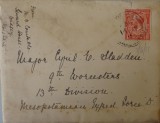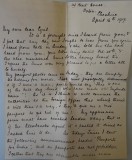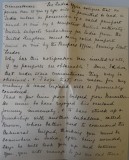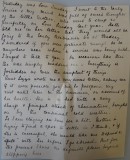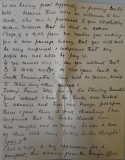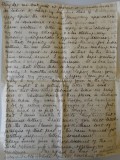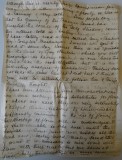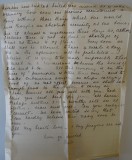fat Kent House, Oxton, Cheshire
April 16th 1917
My own dear Cyril
It is a fortnight since I heard from you, and I feel that any day now I ought to hear from you again.
I heard from Kath on Sunday and she told me she had heard from you, your letter being dated Feb 20th, and she also mentioned Aunt Lottie having heard too. I expect the Aunt was very pleased to get a letter all to herself.
My passport photos came on Friday – they are simply too killing for words. I look most frightfully determined, and if I were a man, people would say “This is one of the bull dog breed, who have made old England’s name”! As it is I think it will convince the authorities at the Foreign Office that where there’s a will there’s a way, and they’ll give me a visé passport to get rid of me! My application form must have reached London today, that is if Mr Allsebrooke signed it and posted it direct, as I asked him to do.
In today’s Times I saw the following announcement, headed “Passports for India”, and as passports are not forbidden, I gather that they are obtainable under some circumstances. “The India Office notifies that no person over 15 yrs of age will be permitted to land in India unless in possession of a valid passport issued or visé by a competent British authority. British subjects embarking for India from the United Kingdom must carry valid passports issued or visé by the Passport Office, Downing Street, London”.
Why has this notification been inserted at all, if no passports are obtainable? Hence, I deduce, that under some circumstances they may be obtained, and I hope that our reason for my wishing to leave England will be favourably considered.
I had a few lines from Wilfred from Marseilles. He seems to have enjoyed his overland journey immensely, and to have struck up a friendship with another subaltern, called Brown, whose Father used to command the Balmoral. Wilfred, thinking you must be somewhere in India, after being wounded, says he will look you up and between you, you will manage to get me out there!
Yesterday was Low Sunday. I went to the Early Service and my mind was full of sweet thoughts of the little Mother, who went to sleep so peacefully on Low Sunday last year. Kath told me in her letter that they would all be going to the Early Celebration too at Badsey.
I wondered if you were fortunate enough to be anywhere near where a service was being held. I longed to talk to you. On occasions like this the war simply maddens one. Everything is forbidden us even the simplest of things.
Aunt Lizzie wrote me a very sweet letter, asking me if it were possible for me to postpone my visit until later in the summer, on account of her health. She is in bed with a very sharp and painful attack of rheumatism, brought on by the continual cold weather. So I am staying on here for a bit. Mother is trying to find a spot to settle in I think, and if she is successful, she would like me to spend a “spell” with her before I go abroad. But for the present I have no definite plans beyond stopping here.
We are having great difficulty in proving Cecil’s “Will”, because there were no witnesses to his death, who can be produced to give absolutely certain evidence that he died in action.
I hope, if a cable from me reaches you asking you to wire passage money, that you will not be very surprised and indignant that my people are not able to pay it.
If you cannot wire it, can you instruct Cox & Co to cable me £70, or else your bank in South Kensington? This will be easier, won’t it, than any other method?
Today’s Times tells us of Sir Stanley Maude’s “feint” retreat and how the Turks were tricked to advance and then our troops fell upon them and gave them a good thrashing. I am surprised that the Turks should have been caught out so easily. It was a case of their “wish being father to the thought”.
April 18th – I had a reply to my application for a passport, this morning, from The Foreign Office. They tell me that just at present it is inadvisable for ladies to travel by sea, but that if I will apply again the 1st week in June, my application will be considered and a decision given me.
I have written a letter in reply to this stating my case very strongly, and also stating my nursing qualifications and offering my services in that capacity on any boat leaving for India within the next few weeks.
I am making my case as urgent as possible so that by the time June comes round I may not be kept waiting another 6 weeks for their decision. It is bad luck for us that letters take so long to get a reply – nearly 3 months will have elapsed since you suggested my joining you and before I can get a reply to my letter answering yours in the affirmative. You ought to be getting my letter this week.
I hear that Territorial troops stationed in India are being sent to Eastern fronts, and their place in India is to be taken by worn out troops, who have done a lot of active service. I wonder if this is a fact.
My mind is so full of the Foreign Office etc that I seem unable to write anything but a business letter. I hate sending you dull letters. All the same I know you get the same sort of paralysis of that part of the brain required for writing uninspiring letters, sometimes.
Today’s Times gives a short account of the Turks retreat into Samarra, offering no resistance. I’m afraid the heat is always indescribable where you are, according to the Times.
Although this is nearly May, Spring seems far away. It is either snowing and frosty, or else it raining and very cold. Some people say that the opening of the Panama Canal has diverted the course of the Gulf Stream, causing this intense cold in Western Europe.
I have lately read a book called “Guy and Pauline” by Compton Mackenzie. I would like you to read it some day because there is an episode in the lives of Guy and Pauline which you will recognize as having occurred in our lives too. I don’t like the book altogether but it is an interesting analysis of character. Pauline does not take the same line as I did, but I think you will be interested to follow her and Guy’s lines of thought.
I have been attending some demonstrations on war cookery, where substitutes for flour and wheat are used. They are very interesting and useful demonstrations. If housewives are sufficiently economical in the use of flour, the shortage of flour will be minimized and we shall be able to tide over until the harvest.
Aunt Jessie’s cook makes all the bread now, barley bread, mealey bread etc. Of course it is necessary to mix some with flour with these cereals, but one saves at least half the quantity. We never have potatoes now but eat boiled rice instead. It is extraordinary how soon one becomes accustomed to doing without those things which one would have thought an absolute necessity at one time.
One is almost a vegetarian these days too, although I believe there is not so great a shortage of meat as there is of flour. Very soon we shall not be allowed to have 4 meals a day, tea in the afternoon will be prohibited. I believe it is going to be made impossible to have a meal in a restaurant between the hours of 2.30 and 6.30. All this economy is on the lines of “prevention is better than cure” and to make submarine warfare on ships carrying food of no real affect, because we shall have enough food in the country to carry on.
I hope, dearest, all goes well with you. God bless you and keep you from all harm.
Perhaps another 3 or 4 months will see us together – man and wife. Can you realize it? I cannot. We have waited so long that I can hardly believe this may soon be over.
All my heart’s love - and my prayers are with you.
Ever your devoted
Mela

